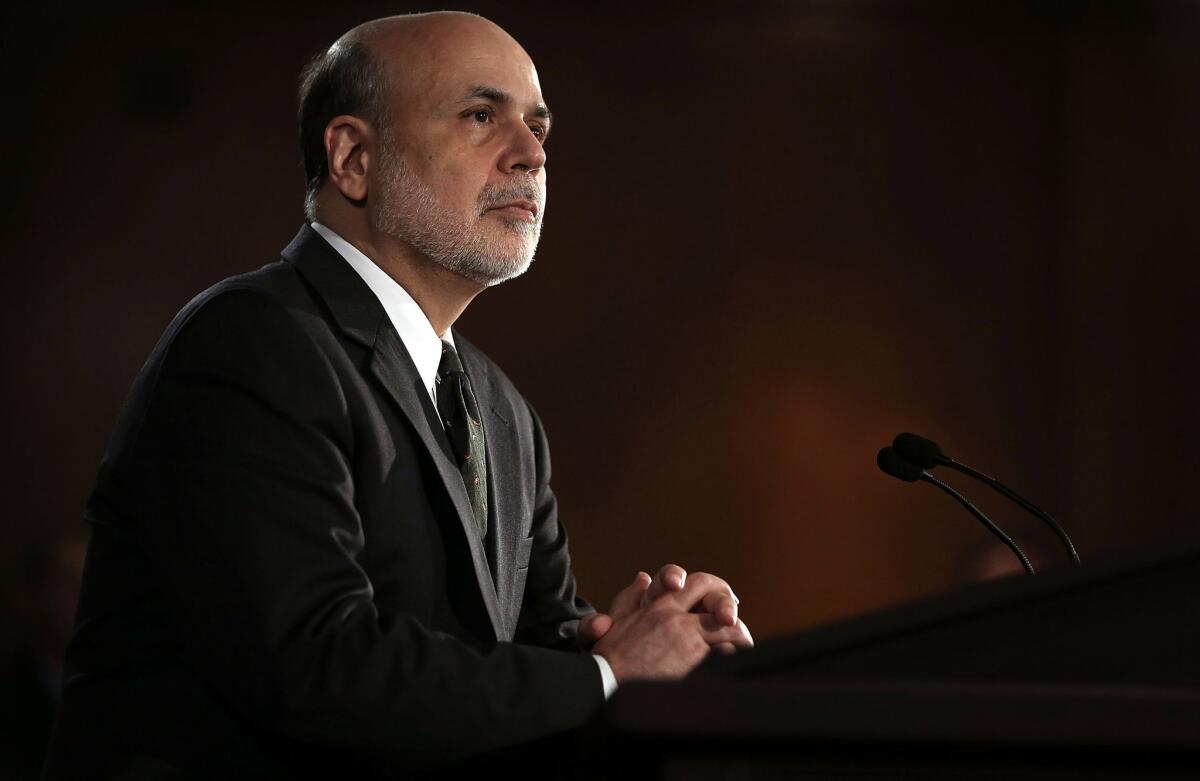Fed’s plan for the economy a surprise to many investors

- Share via
NEW YORK -- Everyone on Wall Street knows that the Federal Reserve will eventually stop its $85-billion-a-month bond buyback program and see if the U.S. economy can stand on its own two feet. Though most investors want this to happen and look forward to when the economy is booming again, many worry about what could happen to the economy without this government money.
So it was a surprise to many when a highly anticipated statement from the Federal Open Market Committee on Wednesday promised that the Fed would continue its buyback program for the time being, even though committee members are optimistic about the economy.
“They’re optimistic, so they see the economic airplane on the runway rolling, but what they really want is to continue to throttle it to make it run fast enough to take off,” said Jack Ablin, chief investment officer for BMO Private Bank in Chicago, employing one of the many metaphors of the day (Bernanke himself spoke of landing on an aircraft carrier).
Investors should eventually realize this is a good thing for the moment, Ablin said: both an improving economy and a continuation of the buyback program, even if they did sell off stocks after Bernanke’s news conference.
“Once equity investors go home and take a deep breath, this is probably a net positive for them,” Ablin said.
Analysts including Jim Russell, senior equity strategist at U.S. Bank Wealth Management, had expected the Fed to lay out the conditions in which it would taper its buyback program. But Bernanke was more specific than Russell had anticipated, laying out a groundwork for the end of the buyback program, which he said could occur next year.
In the bond-buyback program, “the fuse has been lit, we’re in the 8th inning,” he said. “We’d call it a moderate surprise -- the pace of the taper might be more aggressive than we had thought.”
The Fed has to make sure that pumping money into the economy does not cause inflation to jump. But its statement Wednesday indicates that it is more focused on making sure the economy is strong than on whether inflation will rise sometime in the future.
“Since inflation is a non-issue until much later, the central bank can take its time to make sure the economy is on solid footing before even thinking about withdrawing some of the stimulus,” said Sung Won Sohn, an economist at Cal State Channel Islands.
Still, the Fed’s optimistic assessment of the economy was a surprise to some, including Michael Gapen, director of U.S. Economic Research and Global Asset Allocation at Barclays. Although it’s true that the housing market has rebounded, businesses are spending, and consumers are buying more, there are still strong fiscal head winds, which the Fed says have lightened, Gapen said.
“I’m surprised that they’re placing so much weight on their forecasts, that the fiscal drag will wane relatively quickly and that growth will accelerate so fast,” he said.
Still, initial jobless claims are down and consumer spending is up over the last year, according to latest Market & Economic Outlook report from U.S. Bank Wealth Management.
“We believe these lower levels of claims may indicate that employment gains are likely to continue, potentially aiding consumer activity, and when combined with improving retail sales may indicate consumers are on the rebound from the tax increases enacted at the beginning of the year,” said Rob Haworth, a senior investment strategist at U.S. Bank Wealth Management.
ALSO:
Dow tumbles more than 200 points after Fed meeting
Investors on edge before Fed meeting
Live blog: Fed chairman Bernanke’s outlook for the economy
More to Read
Inside the business of entertainment
The Wide Shot brings you news, analysis and insights on everything from streaming wars to production — and what it all means for the future.
You may occasionally receive promotional content from the Los Angeles Times.











